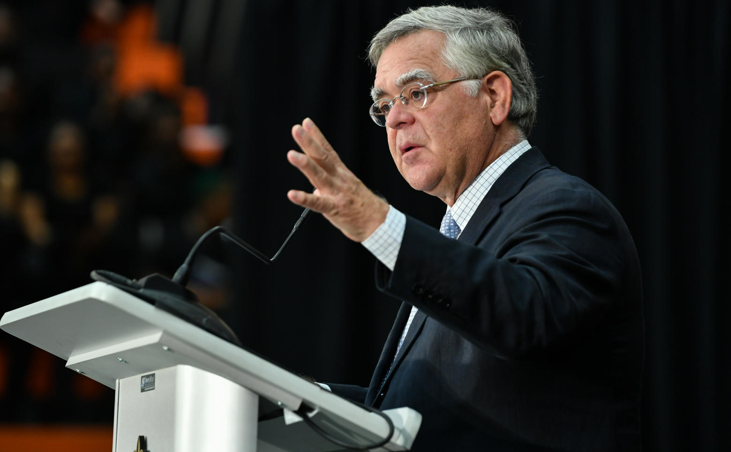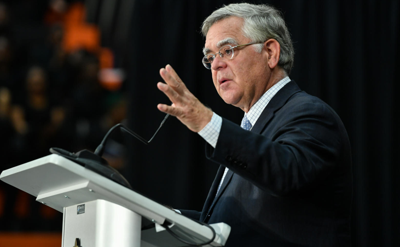
Mayor John Cooper delivered Nashville's 58th State of Metro Address Thursday morning, announcing his plans to increase teacher pay, continue pursuing the city’s transportation overhaul and triple Nashville’s affordable housing funding.
Cooper framed his speech in the context of refocusing on growth and progress after having been forced to focus on the health crisis of the past year. This anchored the address in the pending accomplishments of the future rather than on the present state of Metro. In so doing, Cooper positioned Metro Nashville with COVID-19 behind us and pre-COVID plans now back on track.
“At last year’s State of Metro, my message was a statement of principles as much as it was a review of our budget priorities,” Cooper said. “In a time of unrelenting crisis, we stood firm on our priorities: a sound budget, good schools, strong neighborhoods and the long-term success of our economy.”
Cooper's investment in teachers comes via a budget proposal that includes an extra $81 million for Metro Nashville Public Schools and specifically raises the average teacher salary by $6,900, with a new salary structure intended to do away with compensation plateaus. If passed, the plan would seek to supplement federal investment in social-emotional learning with an extra $2.5 million. He ranked it “Metro’s largest-ever investment in public education — both in operating and capital dollars.”
Relatedly, Cooper seeks to have teachers with eight to 15 years of experience receive a salary bump of $10,800.
Cooper pivoted from the future of Metro Schools to the future of his ambitious campaign commitments to a massive transportation plan en route to being the most expensive transportation expenditure in Metro history. This comes with a traffic management center and so-called smart signals expected to mitigate congestion. But perhaps most notably, it involves turning Metro Public Works into a local department of transportation for Nashville to manage those things — a controversial means, some critics contend, to achieve a widely desired outcome.
“We’re forming and staffing a Department of Transportation that is outcomes-driven and accountable to measurable results,” Cooper said.
The Metro Council adopted the transportation plan in December and has $15 million available between state and federal funding to establish it, $3.5 million of which would activate NDOT.
The mayor announced a forthcoming proposal to allocate $25 million in the 2021 fiscal budget for restoring funding to WeGo Public Transit, which will be completing a three-month term of operating on a line of credit via Fifth Third Bank just as the budget goes into effect.
New funding will provide for 42 new transportation jobs. Cooper committed to improving sidewalk construction times by 50 percent and reducing costs thereof by 20 percent within 12 months of establishing NDOT.
The mayor also addressed investment in affordable housing after highlighting historic diversity in Nashville government, announcing Metro’s largest employee pay plan to the tune of $30.4 million and applauding emergency services with emphasis on first responders to the Second Avenue bombing and Police Chief John Drake’s “new standard of policing.”
In addition, Cooper characterized Metro as “poised to more than triple our investment in affordable housing” upon combining city expenditure with federal funds to come from President Joe Biden’s American Rescue Plan. State and federal investment in affordable housing, Cooper expects, will be around $37.5 million by implementing five “forthcoming recommendations” from the administration’s Affordable Housing Task Force.
The five recommendations are as follows:
- The 2021 budget proposal increases the $10 million Barnes Fund to $12.5 million with $10 million more Cooper said he will recommend to Metro Council.
- Cooper said he will recommend the establishment of a Catalyst Housing Fund with $10 million in federal funds to make quick actions aimed at preserving affordable units.
- Metro Council can also expect to see legislation for a new program that provides a “$3 million payment in lieu of taxes” in the months to come. The program would adjust developers’ tax bills when they create new units.
- Cooper’s capital spending plan allots another $2 million for affordable housing through tax abatements and infrastructure participation agreements.
- The mayor committed to working with Budget and Finance Chair Kyonzté Toombs to infuse an as-yet-unrealized proposal with community feedback on how best to use three acres of Metro-owned land on 24th Avenue North.
The mayor has expressed support for using property tax revenue generated by
the future Oracle campusto fund additional affordable housing efforts. .
In addition to education, transportation and affordable housing, the $1.2 billion Oracle project and the economic impact plan surrounding it mark Nashville’s biggest private investment in history, Cooper noted. He called the project “an opportunity to jumpstart our economic rebound” from the pandemic and “a path for success in the digital economy. All with no expense in our budget. And no new debt.” Even so, questions persist about the $175 million tax incentive encouraging Oracle to invest in River North’s public infrastructure.
Cooper reaffirmed his Tuesday announcement that COVID restrictions (aside from the indoor mask mandate) will end Friday, May 14, attributing it to six weeks of vaccine availability to adults and lauding Dr. James Hildreth, Dr. Alex Jahangir and the rest of Metro’s COVID-19 Task Force. He noted 40 percent of Nashvillians having been vaccinated, citing several community vaccination events as most responsible — chiefly the mass vaccination event at Nissan Stadium, credited with vaccinating 10,000 people.







